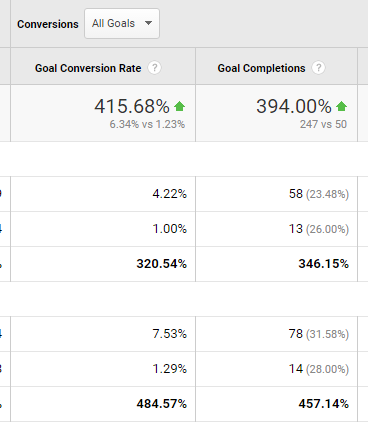Being in SEO can either be a very short-term working relationship or a long-term working relationship. It all depends on how you handle it.
Whether you are an in-house SEO extraordinaire, a freelancer, or an agency owner, there are many pitfalls that can expedite your termination. I own an agency that has been fired but also has many successful long-term engagements; I know both sides of the coin. I want to share with you what I have learned so you can make sure you do not receive that dreaded breakup email.
You Are Bad at Reporting
You could be really great at your job… or you could be really bad. Without good SEO reporting, the client won’t know which you are.
If you are getting great results, you had better be reporting that back to your client. And if they have no idea what a backlink is or what keyword ranking means, you need to sit down with them and make sure they understand.
Whether you are a freelancer, in-house SEO, or an agency, take the time to explain what SEO is, your tactics, and how it is positively impacting their business. Here are some key indicators I look for in reporting SEO:
KPI 1: Sales from organic search revenue
By going to Acquisition > Channels in Google Analytics, you can see how many goal conversions, e-commerce sales, or contact form submissions there are. From there, you can measure month over month or year over year. Personally, I would recommend looking at year over year. It gives you the best barometer — we should all know by now that not all months are created equal.

KPI 2: Traffic from organic listings in search engines
In the same area of Google Analytics, you can also measure your search traffic. Take a look at the screenshot below. You might be thinking, “Ron, this is terrible. Organic search traffic is down YOY.” But if you look closer, you will see goal conversions are up 394%. Could this be from errors reporting conversions a year ago? It’s possible, but regardless, this example is a good illustration of why traffic is KPI #2, not KPI #1. Conversions always mean more than traffic. Clients want to hear about conversions.

KPI 3: Keyword rankings in SEMrush & Ahrefs
At the end of the day, the truth of the matter is all we can really do is influence keyword rankings. We cannot force people to search for certain keyword phrases, and we cannot make them convert into a customer. But, generally, the more targeted keyword rankings that we rank for, the more traffic and sales we will achieve. They usually go hand in hand.
With SEMrush or Ahrefs, we can see our positions in Google across the landscape and see how we are performing.
Obviously, graphs which skyrocket are good. If we can show clients (aka our bosses), “Here is where we were and here is where we are now,” we can show how we are positively impacting their business.

KPI 4: Backlink profile quality
You can also use Ahrefs’s backlink profile ranking as a measure of quality links. Remember — just because you are only getting a few quality links does not mean your initiatives were not successful. Ahrefs can paint a picture into how many quality links we are achieving and how it is impacting our SEO efforts.
KPI 5: Outreach success
Last, in modern SEO, your employer/client should be able to recognize success with your outreach such as links, social media shares, etc. If not, make sure this is established at the beginning of the relationship.
Giving Unrealistic Goals/Expectations
One reason that so many companies claim to be burned by so-called “bad SEO companies” has more to do with a lack of realistic goals or expectations. I have seen it time and time again, where an SEO company is overzealous on promising certain results in a short window.
What are the results of over-promising and under-delivering? You are fired.
Whether you are an SEO company or an in-house marketer, make sure you set realistic expectations from the beginning. As a company, we always want to close the deal, especially when we are competing against other SEO agencies in the market. It can be very tempting to say, “Sure, we can get you there in three months,” but you want to think about the consequences if that doesn’t happen.
It’s always better to be safe than sorry and to close deals that have goals you are comfortable with. On the flipside, if you are an in-house SEO marketer, make sure that before you are hired, you understand what will be expected of you, results-wise, and that you are aligned with what could reasonably be done during the time frame.
Another thing you want to take note of is that a lot of companies can be black and white about how they view marketing. The problem is that SEO is the furthest thing from black or white. In reality, it’s a very gray practice. Make sure you know you don’t control Google, but at the same time, you also know best practices to implement.
The rest is up to the “Google Gods.”
Tanking Rankings
This one is less prevalent, but, if you make a company/client drop in rankings, this will usually equal your swift termination. Here are a few reasons that I have seen someone tank a company’s rankings:
- Not implementing a proper strategy during a website migration or a re-platform project. If you change URLs/site structure, please plan for moving sites.
- Giving bad advice on consolidating pages which were already ranking for good keywords.
- Changing meta information on pages that were already ranking for good phrases.
- Changing settings on CMSs without the necessary experience.
- Forgetting to take off the “no index” tag on the website upon launch or relaunch. Unfortunately, this has happened multiple times.
- Putting a no index tag on a plugin, which, in turn, puts the no index tag on the website.
- Changing the navigational bar categories without looking to see if those pages are getting a lot of organic search traffic (what happens is they are no longer linked from the homepage link and, subsequently, can drop).
Those are the main ones I have seen throughout my career. The common correlation between all of them? The practitioner didn’t have the experience, didn’t think things through, or was careless. All could have easily been prevented, and all resulted in the client suffering from their actions.
Do not become them! Instead of implementing large-scale changes to a website, start small and test them. If they work, then start moving on to bigger changes.
Being Afraid to Fail
This might be somewhat hypocritical, after the above point, but what I really mean is don’t be so conservative that you never push the envelope. SEO is a constantly changing industry. If you are not evolving and pushing the envelope every now and then, you will see your competitors overtake you, which can get you canned.
While you want to be successful, don’t forget that it is okay to fail on a small scale every so often. Just make sure you are constantly A/B testing your different tactics so you can see what works and understand what Google wants to see happening with your website.
Before you change your entire navigational bar with different categories, maybe you can change 2-3 which are low traffic, monitor those rankings, and see how they do post-revisions to the website. If they stay high in their rankings, then it was a good thing, and you can try with more of the categories.
There is nothing wrong with failing in SEO, and truly, that is the only way we learn. Just make sure they aren’t big fails.
Listening to Bad Advice
There are a lot of good SEOs out there who give out a lot of great advice. Obviously, because you are on Search Engine Journal, you are an SEO rock star coming to the best place for information on search engine marketing. 🙂 However, not everyone thinks like you.
I have seen a lot of people in the SEO industry review rock-solid advice and then decide not to use it. Either it’s too hard or time-consuming, or some other lame excuse.
So instead, they visit forums like Black Hat World and other various places which promise extraordinary SEO results in absolutely no time. You can probably guess what happens next. They implement advice from these “experts,” and it usually causes more damage than good.
Make sure that if you want long-term sustainable results and don’t want to be fired, you only pay attention to reputable SEO consultants. Curate your content on different online publications and take everything with a grain of salt. After all, taking advice from an SEO consultant who only works on Fortune 500 sites is much different than doing SEO for local small businesses. Be mindful of who you are listening to — because the tactics can be completely different.
No Testing or Learning
You will no doubt fail if you become complacent with SEO. Google is the ultimate rat race — those who get slow and don’t conform usually die.
The reason for this is: if you are gaining rankings, it means someone had to drop in the rankings. It is a very cutthroat practice, and people tend to forget that. If you get complacent and stop trying to perfect your skill or craft, you will eventually get left in the dust by your competitors.
If you are not paying attention to these two major trends and experimenting with them, then you could be behind right now:
- Not using CTAs in meta information to increase click-through rate.
- Not understanding searcher intent and how to optimize for it.
To stay ahead of the game, I suggest subscribing to authority publications and constantly testing. Here is a list of some of the different newsletters that keep me in the game:
- Searchenginejournal.com (of course!)
- Searchengineland.com
- NeilPatel.com
- Backlinko.com
- TheSEMPost.com
There are many more, but those are the top ones I read. Check them out!
Buying Links
Everyone discusses buying links like it is the worst thing you can do, but it isn’t quite the doomsday prophecy everyone makes it out to be. Google does not, in fact, have a SWAT team they send out to arrest you once they uncover the fact that you bought a Fiverr link for $20.
However, there are repercussions down the line. Buying links is something Google is actively trying to eradicate, and clients/companies generally do not look at this favorably. I know of companies/consultants that have purchased links, and then were caught red-handed down the road when an SEO consultant came in or the client found out via other means. That is not a good situation to be in.
Overall, buying links just isn’t a good idea, in any situation, and it does not give legitimacy to our practice. If you are not getting links organically, figure out a way. Nothing good comes easy.
Constantly read content, develop new techniques, and find new ways to acquire links organically.
Send Bad Outreach Emails
This could also be, “Do not hire shady outreach specialists.” One time a friend hired a shady outreach specialist to work on a law firm account he had, and the outreach specialist sent this email on behalf of a client:
“I really like your blog and notice that you have accepted outside content like guest post blogs in the past. Would you ever be interested in sharing a guest post from us on your blog? We can return the favor and host your guest post article on our site. I have reviewed the blog and I believe I have the guidelines down if you are open to a new article.
If you are open to a guest post idea I can send over a few topics we have been reviewing like:
4 Ways to Help Your Children through Divorce
5 Qualities to Look For in a Divorce Lawyer
Here is our blog, so you can check out some of my work and our areas of coverage
Thanks in advance for taking the time to reply. If you are busy or I have my wires crossed and you do not accept outside content, I totally understand. Let me know and I will quit bugging you.”
This isn’t the most horrible email in the world, but the outreach specialist spelled the firm’s name wrong and sent it to the BAR association.
The BAR association knew this attorney (his client) and sent him an email:
“I received the below inquiry this morning regarding our organization’s blog. Can you please confirm whether the message was sent by someone at your firm? The sender has a Gmail address, and the firm name is spelled incorrectly.
Thank you for your time and attention in this regard.”
Wow, that is bad news. Unfortunately, my friend sent me this chain to see, along with the email correspondence of his client discontinuing services with him.
If your outreach emails look like the above communication, you need to reevaluate your strategy. Send personalized one-to-one emails. Mass emails do not work anymore. They just don’t.
Not Getting Results
This last one should be a no-brainer. SEO is a results-driven business. No one wants to do SEO; they just want SEO to get them results. However, if you are not getting results, don’t fret just yet. Like I said earlier, at the end of the day, all you can do is implement best SEO practices. You cannot make people search Google, you cannot make them buy, and you cannot make users like a website/product they do not like.
If you are not getting results, do not put all of the blame on yourself, do not give into client/employer pressure, and do not look for shortcuts to get results. Do the best job you can using best SEO practices — and the rest will take care of itself.
Image Credits
Featured Image: Pixabay
Screenshots by Ronald Dod. Taken February 2017.




